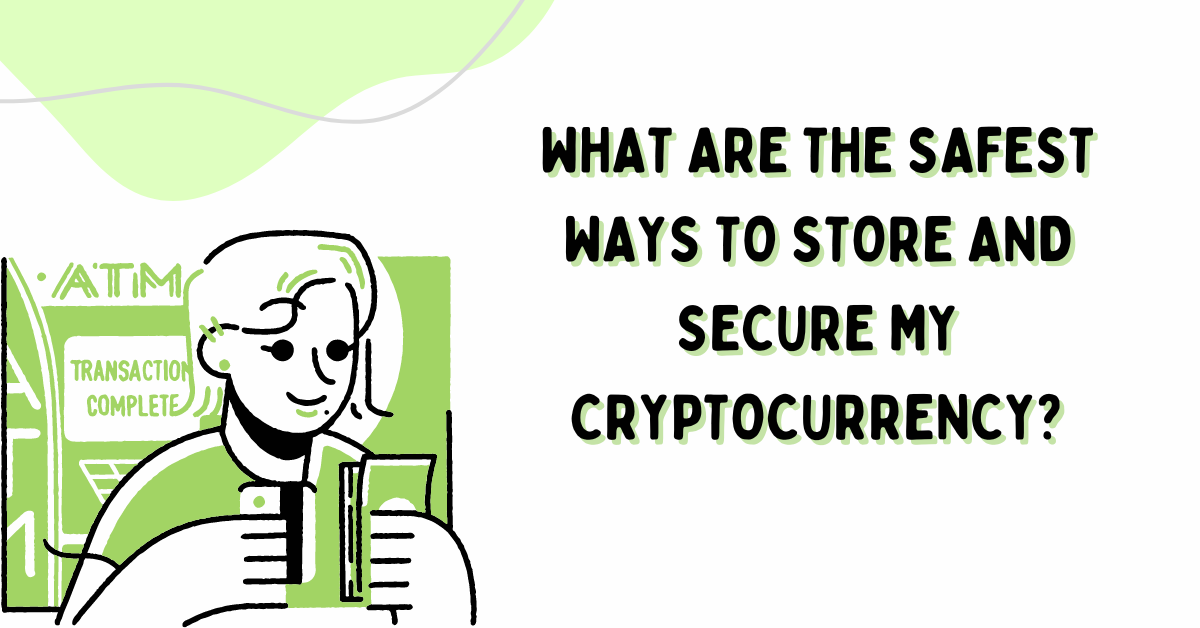In the ever-expanding world of cryptocurrencies, safeguarding your digital assets is paramount. With the rising threat of hacking, theft, and fraud, finding secure storage solutions for your cryptocurrency holdings is essential. In this comprehensive guide, we’ll explore the safest methods for storing and securing your cryptocurrency, ensuring that your investments remain protected against potential threats.

1. Hardware Wallets
When it comes to securing your cryptocurrency holdings, hardware wallets stand out as the pinnacle of security. These physical devices provide an unparalleled level of protection by storing your private keys offline, away from internet-connected devices where they could be vulnerable to hacking attempts and online threats.
Leading hardware wallet brands such as Ledger Nano S, Ledger Nano X, Trezor, and KeepKey offer users a combination of robust security features and user-friendly interfaces. These devices typically come in the form of USB-like devices or small hardware devices with built-in screens, allowing users to securely manage their cryptocurrency holdings without exposing their private keys to potential risks associated with online storage solutions.
Hardware wallets utilize a secure element (a specialized chip) to generate and store private keys, ensuring that they remain isolated from external threats. When you initiate a transaction, the hardware wallet signs the transaction using the private key stored within the device, providing an additional layer of security against unauthorized access and tampering.
Moreover, hardware wallets often include features such as PIN protection, passphrase encryption, and recovery seed phrases to further enhance security and protect against physical theft or loss. If your hardware wallet is lost, stolen, or damaged, you can use the recovery seed phrase to restore access to your cryptocurrency funds on a new device.
In addition to their robust security features, hardware wallets offer unparalleled peace of mind to cryptocurrency investors, knowing that their digital assets are safely stored offline and protected from the myriad of risks associated with online storage solutions. While hardware wallets may come with a price tag, the investment in security is well worth the peace of mind and protection they provide for your valuable cryptocurrency holdings.
2. Paper Wallets
In the fast-paced world of cryptocurrency, paper wallets offer a nostalgic yet highly effective approach to security. A paper wallet is a physical document that contains your cryptocurrency’s public and private keys, printed or written on paper. Despite their simplicity, paper wallets provide robust security by keeping your keys completely offline, away from the reach of hackers and cyber threats.
Creating a paper wallet is relatively straightforward and can be done using various online tools and generators. These tools generate a pair of cryptographic keys (public and private) along with QR codes for easy scanning. Once generated, you can print the keys onto a physical piece of paper or write them down by hand. It’s crucial to ensure that your paper wallet is created in a secure environment and that no one else has access to your keys during the generation process.
The primary advantage of paper wallets lies in their offline nature, which makes them immune to online hacking attempts and malware attacks. Since the keys are never exposed to the internet, there’s no risk of them being compromised by cybercriminals. Additionally, paper wallets are not susceptible to hardware failures or technical glitches, making them a reliable and resilient storage solution for long-term cryptocurrency holdings.
However, it’s essential to handle paper wallets with care and store them securely to prevent physical damage, loss, or theft. Consider laminating your paper wallet or storing it in a waterproof and fireproof container to protect it from environmental hazards. You should also keep multiple copies of your paper wallet in different secure locations to ensure redundancy and accessibility in case of emergencies.
While paper wallets offer robust security and simplicity, they do come with some limitations and risks. For instance, paper wallets lack the convenience and accessibility of digital wallets, as you need to manually input the keys to initiate transactions. Additionally, if your paper wallet is lost, stolen, or damaged, there’s no way to recover your cryptocurrency funds unless you have a backup copy of the keys.
3. Cold Storage
Cold storage refers to any method of storing cryptocurrency offline, away from internet-connected devices. In addition to hardware wallets and paper wallets, other forms of cold storage include USB drives, offline computers, and physical tokens or coins. By keeping your cryptocurrency offline, cold storage solutions provide an extra layer of security against online threats and hacking attacks, ensuring the safety of your digital assets.
4. Multi-Signature Wallets
Multi-signature wallets offer enhanced security by requiring multiple private keys to authorize transactions. This decentralized approach to security reduces the risk of a single point of failure and enhances the overall security of your cryptocurrency holdings. With multi-signature wallets, you can distribute the signing authority among multiple parties, such as yourself, a trusted friend or family member, and a third-party escrow service, further minimizing the risk of unauthorized access.
5. Secure Password Management
Regardless of the storage method you choose, using strong, unique passwords is essential to protect your cryptocurrency wallets and accounts. Avoid using easily guessable passwords or reusing passwords across multiple accounts, as this can increase the risk of unauthorized access. Consider using a reputable password manager to generate and securely store complex passwords for your cryptocurrency wallets and exchanges, ensuring that your accounts remain protected against potential threats.
6. Two-Factor Authentication (2FA): Adding an Extra Layer of Security
Enable two-factor authentication (2FA) wherever possible to add an extra layer of security to your cryptocurrency accounts and exchanges. 2FA requires you to provide a second form of verification, such as a unique code sent to your mobile device or generated by an authentication app, in addition to your password. This additional security measure helps prevent unauthorized access to your accounts, even if your password is compromised, further bolstering the security of your digital assets.
Protecting Your Investments in the Digital Age
As the popularity of cryptocurrencies continues to rise, safeguarding your digital assets is more critical than ever. By utilizing secure storage methods such as hardware wallets, paper wallets, cold storage, and multi-signature wallets, and implementing best practices such as secure password management and two-factor authentication, you can minimize the risk of theft, hacking, and other security threats.
Remember to stay informed about the latest security measures and updates in the cryptocurrency space to ensure that your investments remain safe and secure in the digital age.


Thanks.
❤️❤️❤️
❤️❤️❤️
🥰🥰🥰
❤️❤️❤️
❤️❤️❤️
❤️❤️❤️
Thanks